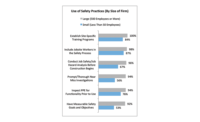“Buy local” is a simple concept that makes sense, especially in construction. Public procurement often carries prescriptive participation goals to engage underutilized or overlooked businesses. Successful contractors demonstrate and document their “good faith effort” to get it done.
For general contractor Flintco, LLC, buying local is more than a transaction. It’s personal.
“For more than 30 years, Flintco has worked with Indian Health Services (IHS), Bureau of Indian Affairs and 77 Native American nations (out of 576 nationally) delivering more than $2.6 billion in construction, including projects in healthcare, education, hospitality and gaming that benefit local tribal members and their families,” says Vernelle Chase, director of tribal relations at Flintco.
The average utilization of tribal contractors and Native workforce by Flintco since 2008 is more than 50%, Chase says. She herself is an enrolled member of the Gros-Ventre Tribe in Fort Belknap, Montana, with Assiniboine and Mandan descent. She joined Flintco in 1994 as a project engineer, holding many positions in addition to her current role.
In Oklahoma, Flintco's work with Native communities and businesses is visible. One of the largest tribal projects, completed back in 2019, was the Cherokee Nation Outpatient Center in Tahlequah, Okla., a $140 million, 470,000-sq-ft full-service medical facility with 200 examination rooms, 34 dental chairs and an ambulatory surgery center.
In Broken Arrow, Okla., Flintco and its subcontractors constructed the public school district’s STEM Innovation Center. Completed in 2021, the building also doubles as a vocational agricultural center. The 50,000-sq-ft modern-design structure includes labs, maker space, and a workshop. The Vocational Agriculture Center includes animal pens and show barns.
Flintco was one of the largest Native American-owned contractors in the U.S., up until 2013 when it was acquired by Alberici Corporation. Since the acquisition, the firm has continued to partner with Native communities and companies.
“The Native tribes became more independent of the federal government starting with the Self-Determination Act of 1974, which gave them more autonomy,” Chase says. “Our internal Growth Opportunity and Utilization Policy (GO-UP) initiative not only helps Flintco meet our contractual obligations around tribal procurement and employment but also helps guide our involvement in local Native communities.”
Chase said working within “Indian Country,” as she calls it, requires adding a fourth leg to what is typically a three-legged stool when it comes to construction priorities: budget, schedule, and quality/safety are often what owners think of first in describing successful construction. While all are important, Flintco also adds a fourth leg—contracting and employment—that includes workforce training for partners and education of the project team about the history, traditions/customs, and expectations of our Native American clients.
Flintco’s training programs provide tribal workers the ability to develop skills in management and trade crafts—skills that last a lifetime and “contribute to the advancement of the local Native communities we serve,” Chase says. Additionally, Flintco works closely with local employment preference programs that assist Native American-owned businesses and trade partners with contracting and supply opportunities to help them grow and prosper, including Tribal Employment Rights Offices (TERO) and the Navajo Employment Protection Act, Chase said.
“I’ve made it part of my mission to provide a seat at the table for Native Americans in the business and infrastructure development within Indian Country,” she added.





Post a comment to this article
Report Abusive Comment